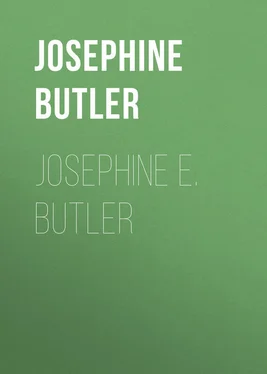Josephine Butler - Josephine E. Butler
Здесь есть возможность читать онлайн «Josephine Butler - Josephine E. Butler» — ознакомительный отрывок электронной книги совершенно бесплатно, а после прочтения отрывка купить полную версию. В некоторых случаях можно слушать аудио, скачать через торрент в формате fb2 и присутствует краткое содержание. Жанр: foreign_antique, foreign_prose, на английском языке. Описание произведения, (предисловие) а так же отзывы посетителей доступны на портале библиотеки ЛибКат.
- Название:Josephine E. Butler
- Автор:
- Жанр:
- Год:неизвестен
- ISBN:нет данных
- Рейтинг книги:5 / 5. Голосов: 1
-
Избранное:Добавить в избранное
- Отзывы:
-
Ваша оценка:
- 100
- 1
- 2
- 3
- 4
- 5
Josephine E. Butler: краткое содержание, описание и аннотация
Предлагаем к чтению аннотацию, описание, краткое содержание или предисловие (зависит от того, что написал сам автор книги «Josephine E. Butler»). Если вы не нашли необходимую информацию о книге — напишите в комментариях, мы постараемся отыскать её.
Josephine E. Butler — читать онлайн ознакомительный отрывок
Ниже представлен текст книги, разбитый по страницам. Система сохранения места последней прочитанной страницы, позволяет с удобством читать онлайн бесплатно книгу «Josephine E. Butler», без необходимости каждый раз заново искать на чём Вы остановились. Поставьте закладку, и сможете в любой момент перейти на страницу, на которой закончили чтение.
Интервал:
Закладка:
The winter floods which so often surrounded Oxford during the years of which I am writing are probably remembered with a shudder by others besides myself. The mills and locks, and other impediments to the free flow of the waters of the Isis, were, I believe, long ago removed, and the malarial effect of the stagnation of moisture around the city ceased with its cause. But at that time Oxford in winter almost resembled Venice, in its apparent isolation from the land, and in the appearance of its towers and spires reflected in the mirror of the floods. “It rained,” wrote George in January, 1856, “all yesterday, and to-day it is cold and damp. Indeed, immediately after sunset the atmosphere of Oxford resembles that of a well, though that is scarcely so bad as the horrible smell of the meadows when the floods are retiring. Then one is conscious of a miasma which only a strong constitution can long resist.”
My health failed. I became weak and liable to attacks of chills and fever. We drove out occasionally to the heights above Oxford, to reach which we were obliged to pursue for some distance a road which resembled a sort of high level or causeway (as in Holland) with water on each side. Looking back from the higher ground, the view of the academic city sitting upon the floods was very picturesque. Indeed, the sound of “Great Tom” knelling the curfew from his tower had a very musical and solemn effect as it came over the still waters, resembling a little in pathos the sound of a human voice giving warning of the approach of night; or, like Dante’s Squilla di lontana —
The distant bell
Which seems to weep the dying day;
but poetry and sentiment could not hold out against rheumatic pains and repeated chills.
I spent several months of that year – 1856 – in Northumberland with our children, my husband joining us after he had completed his engagements as a public examiner in London. His letters, during the few weeks of our separation, seemed to show a deepening of spiritual life – such as is sometimes granted in the foreshadowing of the approach of some special discipline or sorrow. He seems to have felt more deeply during this summer that he must not reckon on the unbroken continuance of the outward happiness which had been so richly granted to us.
To Mrs. Grey. Oxford, June 6th, 1856 .“I am glad to feel that my treasures are in such good hands and life-giving air. I hope their presence at Dilston will contribute to the assurance that marriage is not a severance of family ties, but that both Josephine and I revert with the fondest attachment to old scenes and dearly loved friends at Dilston.”
To his wife. June, 1856.“I am grieved to hear of your sufferings; but you write so cheerfully, and express such a loving confidence in One who is able to heal all our sicknesses, that I dare not repine. However sad at heart I may sometimes feel about you, I will try to bring myself face to face with those mighty promises which are held out to those who ‘rest in the Lord and wait patiently for Him.’ And then I hope we shall still be able to go hand in hand in our work on earth.”
To his wife. July 13th, 1856.“I have been reading Tennyson’s ‘Maud,’ and correcting my review of it for Fraser’s Magazine . Reading love stories which end in death or separation makes me dwell the more thankfully on my own happiness. It is no wonder that I am sanguine in all circumstances, and that I trust the love and care of our Almighty Father, for has He not blessed me far beyond my deserts in giving me such a share of human happiness as falls to the lot of few? Yet He has given us our thorn in the flesh, in your failing health, and our uncertain prospects. But these shall never hinder our love; rather we will cling to that more closely as the symbol and earnest of the heavenly love which displayed itself in that wondrous act – on Calvary – which the wise men of this world may deem of as they will, but which to us will ever be the most real of all realities, and the sure token of our reconciliation with God.
“I think we are well fitted to help each other. No words can express what you are to me. On the other hand, I may be able to cheer you in moments of sadness and despondency, when the evils of this world press heavily upon you, and your strength is not sufficient to enable you to rise up and do anything to relieve them, as you fain would do. And by means of possessing greater physical strength, and considerable power of getting through work, I may be enabled to help you in the years to come, to carry out plans which may under His blessing do some good, and make men speak of us with respect when we are laid in our graves; and in the united work of bringing up our children, may God so help us that we may be able to say, ‘Of those whom Thou gavest us have we lost none.’”
While exercising much self-denial and reserve in making such extracts as the above, I give these few as affording glimpses of his inner mind and deep affection; for his character would be very inadequately portrayed if so prominent a feature of it were concealed as that of his love for his wife, and the constant blending of that love with all his spiritual aspirations and endeavours. That love was part of his being, becoming ever more deep and tender as the years went on. I have spoken of the strength and tenacity of his friendships. These qualities entered equally into his closest domestic relations. In the springtime of life, men dream, speak, write and sing of love – of love’s gracious birth and beautiful youth. But it is not in the springtime of life that love’s deepest depths can be fathomed, its vastness measured, and its endurance tested. There is a love which surmounts all trial and discipline, all the petty vexations and worries, as well as the sorrows and storms of life, and which flows on in an ever deepening current of tenderness, enhanced by memories of the past and hopes of the future – of the eternal life towards which it is tending. It was such a love as this, that dwelt and deepened in him of whom I write to the latest moment of his earthly life, to be perfected in the Divine presence.
On joining us at Dilston, an arrangement was made with the vicar of the parish of Corbridge (in which Dilston was situated) that he should take his duty, occupying his house for the autumn, during his absence from home. Dissent prevailed largely in the neighbourhood. But during the time that he acted as the clergyman of the parish the church was well filled. Many Wesleyans came, who had not before entered its doors, as well as several families of well-to-do and well-instructed Presbyterian farmers – shrewd people, well able to maintain their ground in a theological controversy. They were attracted, no doubt, partly by the relationship of the temporary minister to my father, who was so much beloved and esteemed throughout the county, and a constant worshipper in the village church, and partly by the simple Christian teaching for which they thirsted, and which they now found. There was little real poverty. We visited the people sometimes together, and their affections were strongly gained.
Our return to Oxford was not auspicious. The autumn fell damp and cold. It was decided that I should go to London to consult Sir James Clarke, on account of what seemed the development of a weakness of the lungs. I recall the tender solicitude which my husband showed for me on the journey, and also the kindness of the venerable physician. I was scarcely able to rise to greet him when he entered the room. At the close of our interview he merely said, “Poor thing, poor thing! You must take her away from Oxford.” We proposed to return therefore at once to make necessary preparations for the change, when he interposed, “No, she must not return to the chilling influence of those floods, not for a single day.”
Читать дальшеИнтервал:
Закладка:
Похожие книги на «Josephine E. Butler»
Представляем Вашему вниманию похожие книги на «Josephine E. Butler» списком для выбора. Мы отобрали схожую по названию и смыслу литературу в надежде предоставить читателям больше вариантов отыскать новые, интересные, ещё непрочитанные произведения.
Обсуждение, отзывы о книге «Josephine E. Butler» и просто собственные мнения читателей. Оставьте ваши комментарии, напишите, что Вы думаете о произведении, его смысле или главных героях. Укажите что конкретно понравилось, а что нет, и почему Вы так считаете.












